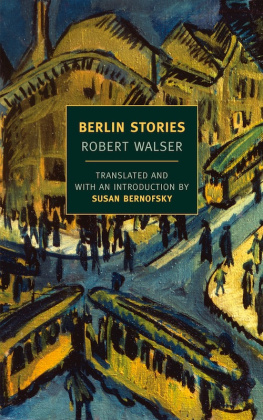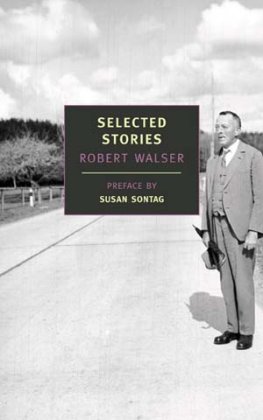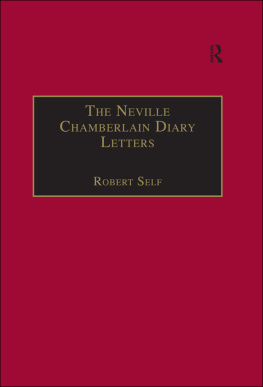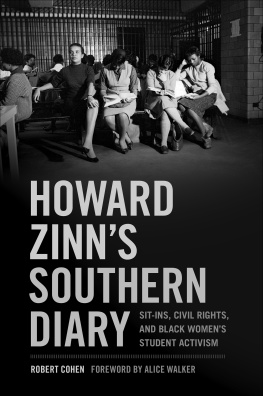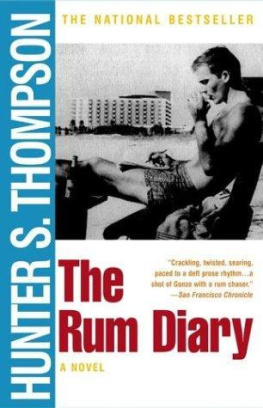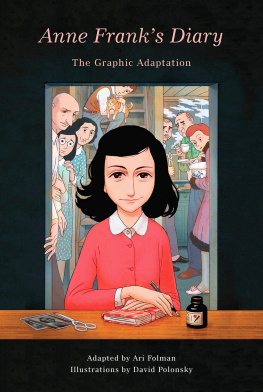Robert Walser - A Schoolboy's Diary and Other Stories
Here you can read online Robert Walser - A Schoolboy's Diary and Other Stories full text of the book (entire story) in english for free. Download pdf and epub, get meaning, cover and reviews about this ebook. City: New York, year: 2013, publisher: NYRB Classics, genre: Prose. Description of the work, (preface) as well as reviews are available. Best literature library LitArk.com created for fans of good reading and offers a wide selection of genres:
Romance novel
Science fiction
Adventure
Detective
Science
History
Home and family
Prose
Art
Politics
Computer
Non-fiction
Religion
Business
Children
Humor
Choose a favorite category and find really read worthwhile books. Enjoy immersion in the world of imagination, feel the emotions of the characters or learn something new for yourself, make an fascinating discovery.
- Book:A Schoolboy's Diary and Other Stories
- Author:
- Publisher:NYRB Classics
- Genre:
- Year:2013
- City:New York
- ISBN:978-1590176726
- Rating:5 / 5
- Favourites:Add to favourites
- Your mark:
- 100
- 1
- 2
- 3
- 4
- 5
A Schoolboy's Diary and Other Stories: summary, description and annotation
We offer to read an annotation, description, summary or preface (depends on what the author of the book "A Schoolboy's Diary and Other Stories" wrote himself). If you haven't found the necessary information about the book — write in the comments, we will try to find it.
A Schoolboy's Diary and Other Stories — read online for free the complete book (whole text) full work
Below is the text of the book, divided by pages. System saving the place of the last page read, allows you to conveniently read the book "A Schoolboy's Diary and Other Stories" online for free, without having to search again every time where you left off. Put a bookmark, and you can go to the page where you finished reading at any time.
Font size:
Interval:
Bookmark:
Robert Walser
A Schoolboy's Diary and Other Stories
INTRODUCTION
SECRETLY, I love art, declares the young Fritz Kocher in one of his school essays. But its not a secret anymore because now Ive been careless and blabbed it. Let me be punished for that and made an example of. Robert Walsers narrators are always praising obedience and punishment: I want to be industrious and obey whoever deserves to be obeyed; A firm command and silent obedience that would really be much better; Anything forced on me, whose necessity has been mutely insisted upon from every side, I try to approach obligingly, and like it; We are cowards; we deserve an Inquisitor to discipline us; and so on. At the same time, however, Walsers narrators especially his schoolboys, and there is something of the schoolboy in all of his narrators are possessed by a levity that borders on giddiness. Walsers writing has an energy that exceeds or undercuts or otherwise complicates its own demand to be disciplined.
The associational flights of Fritzs class assignments escape the teachers authority even as they appeal to it:
Colors fill up your mind too much with all sorts of muddled stuff. Colors are too sweet a muddle, nothing more. I love things in one color, monotonous things. Snow is such a monotonous song. Why shouldnt a color be able to make the same impression as singing? White is like a murmuring, whispering, praying. Fiery colors, like for instance Autumn colors, are a shriek. Green in midsummer is a many-voiced song with all the highest notes. Is that true? I dont know if thats right. Well, the teacher will surely be so kind as to correct it.
No teacher is in a position to say whether midsummer green is a many-voiced song, at least not without assuming a position of absurd literality, and so Fritzs evocation of the teachers corrective power is a way of revealing its limits. Still, it would be wrong to say this passage only mocks or ironizes submissiveness. There is the typically Walserian statement: I love things in one color, monotonous things. Praise for the monotonous, the uniform, the mundane, the insignificant such sentiments are everywhere in Walsers work and maintain a crucial ambiguity. On the one hand they are expressions of poetic attunement to those aspects of the world we too readily overlook, and for which writers concerned with heroic exploits often have no time. On the other hand, Walsers celebration of the monotonous or uniform returns us to his fascination with subservience, with relinquishing all personality to imposed order: Modestly stepping aside can never be recommended as a continual practice in strong enough terms. The force of Walsers writing derives from this simultaneous valorization of irreducible individuality and of sameness, smallness, interchangeability. In the most various terms, Walser praises monotony; it makes it wonderfully difficult to read his tone. When is he serious? When is he mocking the will to conformity? Susan Sontag has written that The moral core of Walsers art is the refusal of power; of domination. And yet, paradoxically, part of the power of Walsers art lies in how that refusal of domination interacts with his narrators demands to be dominated. Walsers voice is a strange mix of exuberance and submission, lyrical abandon and self-abnegation. His refusals are antiheroic, wavering; they reveal sometimes comically, sometimes tragically how the desire to be ruled enters the subject, the son, the servant, the pupil.
How can a writer refuse even the power of refusal, preserve his freedom while falling all over himself to give it away? Maybe the answer has to do with how Walsers singular sentences themselves step aside: one of the most notable effects of his prose is how it seems to evaporate as you read. Walter Benjamin said of Walsers garlands of language that each sentence has the sole purpose of rendering the previous one forgotten. This is not to say there arent depths of meaning and memorable passages, but Walsers genius often involves a kind of disappearing act. W. G. Sebald has remarked that Walsers writing has the tendency to dissolve upon reading, so that only a few hours later one can barely remember the ephemeral figures, events and things of which it spoke Everything written in these incomparable books has as their author might himself have said a tendency to vanish into thin air. The content of Walsers sentences can vanish, I think, because Walser is often less concerned with recording the finished thought than with capturing the movement of a mind in the act of thinking; its the motion that stays with you, not a stable set of meanings.
Perhaps this is why Walser was drawn to the conceit of schoolroom essays for his first book: Kocher is always worrying about managing his time, or running out of it, or having to force himself to write in the absence of an idea, allowing Walser to emphasize the present tense of composition. But even outside the schoolroom, Walsers other narrators frequently break off, interrupt themselves, or explode the fictional frame altogether: In the bright, hot midday sun I would stop for a moment to rest under a fir, beech, or oak tree, stretching out on the moss or grass But where am I? Am I actually on a hike right now? How is that possible? Walsers digressive immediacy is as important as what his words denote. The present time, surrounding you, singing and making noise, cannot, Fritz claims, be put down in writing in any satisfactory wayand yet thats precisely what Walser repeatedly accomplishes, registering the rhythms of the present in the action of his sentences. Fritz again: It is as though you could hear Thought itself softly whispering, softly stirring. Its like the scurrying of little white mice. Walsers sentences might declare the need for obedience, order, subservience, but those declarations are dissolved in the agitations of his syntax. If its true, as Fritz says, that Style is a sense of order, then we could say that a style that evaporates is a method of escape. The meanings of Walsers meandering sentences scurry away right under the nose of the teacher or Inquisitor. The schoolchild is at that critical juncture where indoctrination intensifies, where pedagogy shades into penality, but the child nevertheless possesses unconquered territories of freedom and feeling whose topography Walsers sentences describe so beautifully even as they disappear.
It is often remarked that, although he wrote his greatest novels in the period leading up to the First World War, Walsers writing says very little about the disasters of his time. Nonetheless I find it impossible to separate the interplay of independence and conformity in Walsers work from the surpassing catastrophes of the twentieth century. (The last piece in this volumeHanswas published in 1920, just four years before the world was introduced to Hans Castorp in Thomas Manns The Magic Mountain. At the end of Walsers story and Manns novel, the two mercurial Hanses enlist.) In the short piece In the MilitaryWalser served in the Swiss National Guard we again encounter a struggle between the values of refusal and obedience. I am certainly a proponent of the slackards life, laziness, happiness, and peace; but alas, writes the confused narrator, I am also for the military. I think peace is nice and I think the military is nice. The military is nice, he explains, because it frees you from the obligation to think, and yet to imagine a million-strong crowd of individuals who dispense with the thinking of any halfway or entirely reasonable thoughts. Is this not a picture to instill horror? However, the narrator declares, I myself am one of those fellows who find it nice not to think. Also, I hold the principle of service in immensely high esteem. The schoolboys mixture of flightiness and obsequiousness is also typical of Walsers soldiers: Soldiers are a kind of childrenas is the narrator who thinks of war and peace in terms of niceness. It isnt glory or patriotic heroism that appeals to him: Where else but in the military and as a simple, ready-and-rough soldier could one ever dare and take the liberty to devour an apple or, say, plum tart around eight at night, in lovely evening light, on a public small-town street, with unbounded delight and complete peace of mind? Its both disturbing and funny to find a young man open to a military life because it might grant him permission to eat a cake at an odd hour in the open air a young man who desires extreme regimentation only to recover a furtive liberty. One imagines Walsers narrator having his dessert and then deserting. The quick shifts between ebullience and subjugation, between desiring a master and eluding his grasp no matter how childish or parodic the temperament inevitably evoke the imminent cataclysms of European fascism. Against this backdrop, Walsers evasive maneuvers, his Bartleby-like refusal of ambition, take on acute political significance: Walsers narrators humble themselves so thoroughly before authority that it can take the authoritarian a while to realize theyve escaped.
Font size:
Interval:
Bookmark:
Similar books «A Schoolboy's Diary and Other Stories»
Look at similar books to A Schoolboy's Diary and Other Stories. We have selected literature similar in name and meaning in the hope of providing readers with more options to find new, interesting, not yet read works.
Discussion, reviews of the book A Schoolboy's Diary and Other Stories and just readers' own opinions. Leave your comments, write what you think about the work, its meaning or the main characters. Specify what exactly you liked and what you didn't like, and why you think so.



